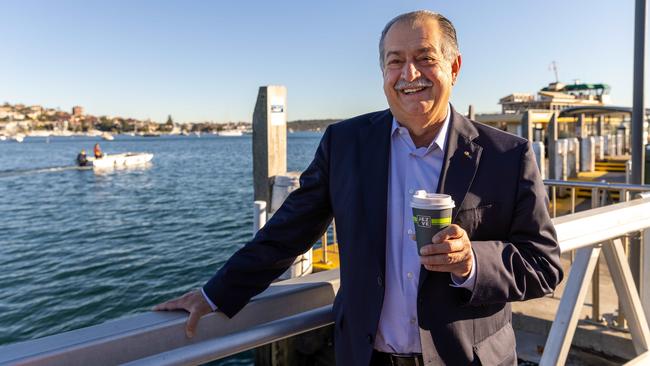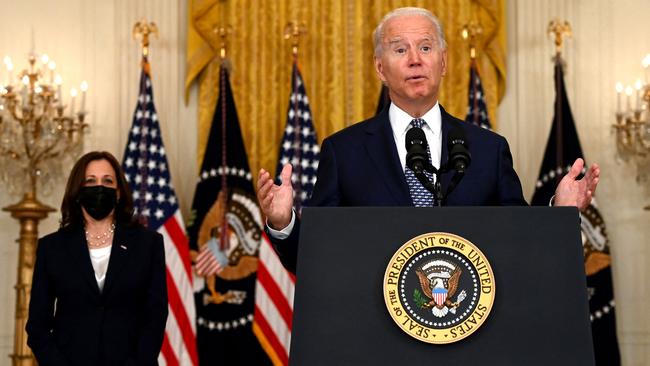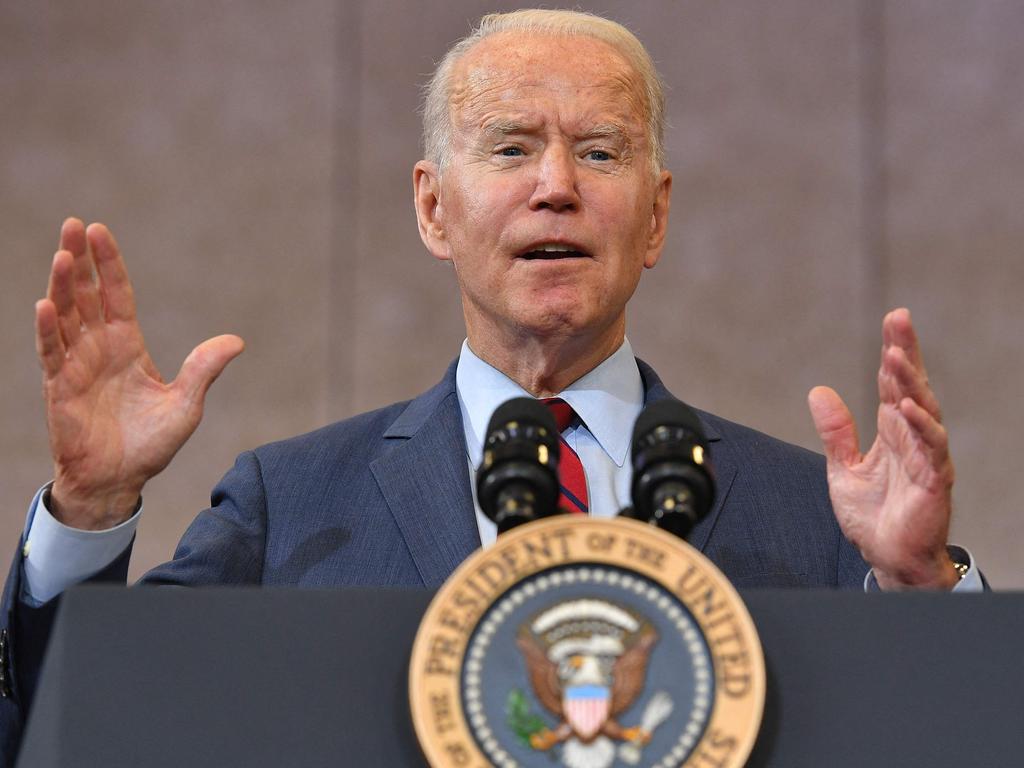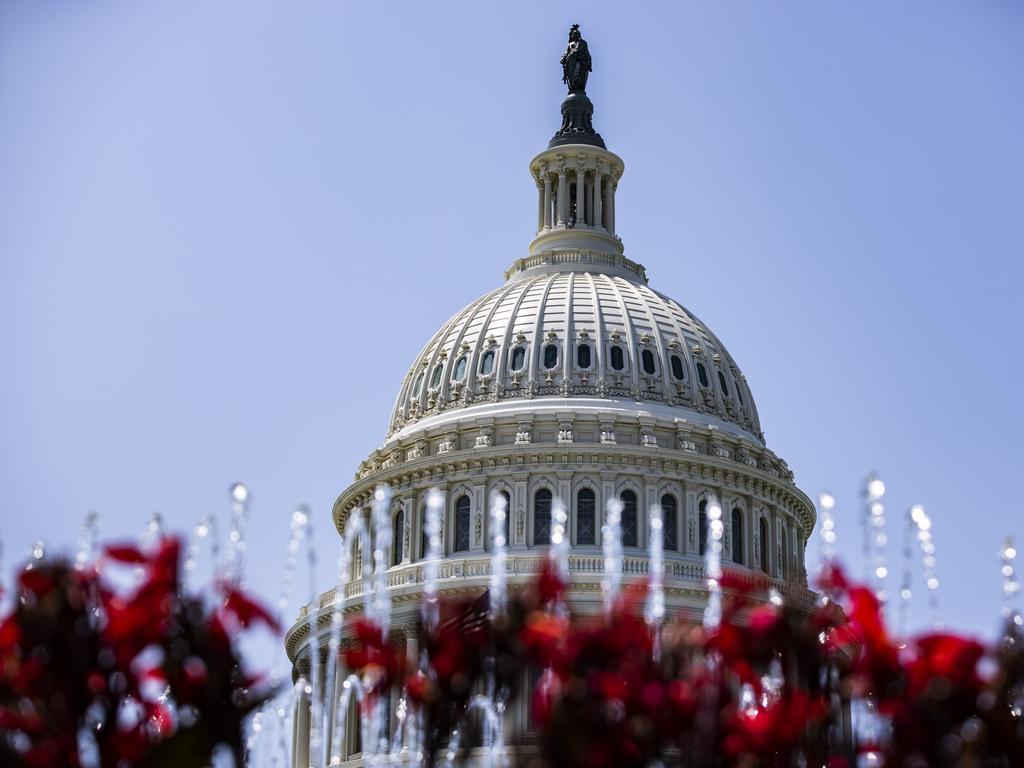How Andrew Liveris helped Joe Biden pass his big infrastructure bill
As the Biden administration applauds the passage of its historic infrastructure bill, former Dow Chemicals chief Andrew Liveris is quietly having his own celebrations.

As the Biden administration applauds the passage of its historic $US1.2 trillion ($1.64 trillion) infrastructure bill by the US Senate, former Dow Chemicals chief executive Andrew Liveris is quietly having his own celebrations.
Despite living in Australia for the past 18 months – grounded by Covid-19 – he has spent the past few months leading a business coalition working to help the passage of the bill, focusing on key US senators.
Working the phones from Sydney, Liveris has been co-chairing Build Together, a group of US business leaders aimed at getting bipartisan support for infrastructure across the US, lobbying and working with US senators to get the Biden bill passed.
This follows an approach late last year by the chairman of box company US Corrugated, Dennis Mehiel, a key Biden supporter who Liveris has known since his days running Dow in the US.
The group includes the chief executives of some of America’s largest companies including General Motors (Mary Barra), Delta Airlines (Ed Bastian), Nike (John Donahoe), Duke Energy (Lynn Good), Raytheon Technologies (Greg Hayes), IBM (Arvind Krishna), Walmart (Doug McMillon), Bank of America (Brian Moynihan) and Procter & Gamble (David Taylor).
Liveris on Wednesday welcomed the passage of the bill in the Senate, which saw a rare coalition of support from both Democrats and Republicans, passing with a strong 69 votes to 30, ensuring that it will pass comfortably in the Democrat-controlled House of Representatives.
“It is a tremendous bipartisan achievement which augurs well for American leadership on the big decisions for this century, especially of the digital and green kind which is vital for the growth of the US economy,” he told The Australian.
The bill will see billions of dollars invested in upgrading America’s ageing infrastructure, including roads, rail, and bridges.
It also includes funding for a national network of electric vehicle charging stations, the expansion of high-speed internet access to rural areas and the replacement of all the country’s lead pipes as part of an investment in clean drinking water.
The move sparked a surge in shares of Australian companies that are likely to get a boost from the spending package, including BlueScope, James Hardie and Macquarie Group.
The Darwin-born Liveris, who worked for Dow Chemicals for more than 40 years, the last 14 as chief executive, has been an adviser to two US presidents, Barack Obama and Donald Trump, on manufacturing policy.
Despite moving back to Sydney after his retirement from Dow three years ago, he has kept up a strong interest in the US, where he is on the board of IBM and chairman of newly listed electric car company Lucid.

Plans for a life moving back and forth between the US and Australia came to an abrupt halt 18 months ago when Australia closed its borders. But with the change of administration in Washington following the November 2020 election, Liveris was keen to keep up his ties, including those made under the Obama administration in which Joe Biden served as vice-president.
“Soon after Biden’s election, I was contacted by a group of Democrats who understood some of Biden’s big ambitions,” Liveris said in an interview with The Australian this week from his Sydney apartment.
“One of the most seminal was infrastructure.”
Liveris said the Democrats wanted help from business leaders to help convince Republican senators to pass the ambitious infrastructure package.
While the Democrats technically control the 100-seat Senate (currently made up of 50 Republicans, 48 Democrats and two pro-Democrat independents, with Vice-President Kamala Harris having the deciding vote), voting in US politics is much more fluid than in Australia.
“We formed a bipartisan group of CEOs,” Liveris said. “We wanted to come to the table and see if we could figure out how to get the balancing act between spending on the new economy – on digital and clean energy- and the old economy such as road and rail.
“We were working on how we could make the bill positive, not punitive, to American business. There is a balancing act between the size of the bill, what’s in the bill, how it is going to be paid for.”
The group has been working the phones, lobbying Republican senators and some Democrats, for the past seven months.
“We went to work in the background, pretty quietly, working with the senators,” Liveris said.
“We knew we had to get at least 10 Republicans to make sure it could pass the Senate.”
In the end, 19 Republican senators this week supported the bill along with all Democrats, a rare exercise in bipartisanship backing Biden’s infrastructure plans.
The grandson of Greek migrants to Australia, Liveris developed a strong friendship in the US with New York businessman Dennis Mehiel, a Greek-American with close ties to Joe Biden.
Mehiel was a key figure in 2016 in urging Biden to run for president against Trump.
Liveris and Mehiel have been working together lobbying senators for the bill and providing inputs to the White House on how to make the initial bill more palatable to business – a move that was needed to garner the support of Republican senators.
“The two of us built this consensus under the name Build Together,” Liveris said.
“It’s a unique American model; to form a group (of business people) who would work very closely with government to impart inputs to the government they would not otherwise get if they didn’t get it from the business community.”
Liveris says one of the big “tripping points” of the bill was Biden’s initial insistence that the infrastructure proposals were packaged together in a much broader group of social initiatives which includes improvement in funding of childcare, welfare payments and greater access for minorities.
“If you put all that into the bill, it is a $US3-$US4 trillion spend,” he said.
He said one of the arguments of the Build Together coalition to the Biden administration was that the “soft infrastructure” side of the bill – the social changes – should be separated from the “hard infrastructure” to allow it to get more bipartisan support.
“We were trying to keep it as a bipartisan effort, scoping it around real need for rail and public transport and roads and bridges, ports and airports, water and electric power infrastructure, and broadband and charging stations,” he said.
“Keeping to that scope was really one of our biggest contributions. We were more or less a sounding board to say (to the Biden administration) to ‘You are not going to get the bigger thing through if you keep bolting on things that end up being very good for US citizens, but if it means the business community gets laden with higher taxes and new costs, it will stop investing. You will end up having the negative effect of having all this social infrastructure and payments, but your revenues will go down as the American business community will stop investing.’
“Keeping it pro-investment and scoping it appropriately was one of the big accomplishments.”
Liveris said the exercise involved hours of phone calls and Zoom meetings. “There was a period when it was phone calls every night (Australian time),” he said,
“The senators we had to get over the line were all Republican, but we did talk to the Democrats as well. There were some Democrats who had to be convinced that pro-business was right.”
One of the challenges was keeping Senate minority leader, Republican Mitch McConnell, from opposing the bill. “He could have easily kiboshed it,” Liveris said. “Keeping it bipartisan took a huge amount of work.”
He said the period also involved ongoing discussions with the White House, a key contact being White House counsellor Steve Ricchetti.
Liveris said the involvement of business in trying to lobby both sides of politics to get legislation like the infrastructure bill passed in the US was different to the approach taken in Australia.
“I don’t see it as strong here,” he said. “The business community (here) speaks their own book; they don’t go across sectors.”
Liveris, whose retired as chief executive of Dow in 2018, is a director of IBM, ASX-listed engineering services company Worley, ASX-listed battery company Novonix, and Saudi Aramco, and is chair of US electric car company Lucid Motors.
Lucid, which is building a $US700m electric car plant in Arizona, listed on the NASDAQ exchange in July in a deal that was worth more than $US4.4bn.
Liveris became closely involved through his connections in Saudi Arabia, whose sovereign wealth fund was a major investor in Lucid’s predecessor, Atieva, originally a California electric battery maker.
“They invested in the company three years ago,” he said.
“They (the Saudis) asked me if I would bring some of my industrial experience and share it with the then board and help take it to the next level, which we did.
“We invested, and we built the factory, which will be up and running by October.
“Late last year the idea of listing it as an IPO occurred, but the SPAC (special purpose acquisition company) route has become very prevalent in America.
“When we went through the SPAC route, I was asked to stay on as chairman of the public company.”
The NASDAQ listing was done in connection with veteran Wall Street deal-maker Michael Klein, through his latest special-purpose acquisition company Churchill Capital IV.
Liveris said the plan for the company was to start off with a mass-market sedan which will compete with Elon Musk’s Tesla, called Lucid Air.
“We will start at $US70,000, which is very competitive, with a luxury high-end version called The Dream, which will cost $US160,000,” he said.
“Tesla is the benchmark,” Liveris said.
“They have had a dozen years to convince us all that electric vehicles are good.”
Liveris said there would be “plenty of room” for electric cars in the global automotive market, with all the major car companies moving into mass-producing electric vehicles.
After 18 months in Australia, Liveris plans to make a business trip to the US with meetings including with US Energy Secretary Jennifer Granholm, who he knows from her days as governor of Michigan, the state where Dow is headquartered.
Liveris believes that there is more potential for Australian start-ups to get noticed in the US, with the $39bn bid by Square for Australian payments company Afterpay being a good example.
“We need to find a way to get our companies better known over there,” he said.
Meanwhile, he is headed back to the US, keeping up the American connection.
“Lucid’s big claim is that it’s battery is way more efficient and has a higher range for less charging time,” Liveris said.
“The range we have for Lucid is more than 500 miles (800km) on a single charge.
“The next best (in the market) is 400 miles.”







To join the conversation, please log in. Don't have an account? Register
Join the conversation, you are commenting as Logout